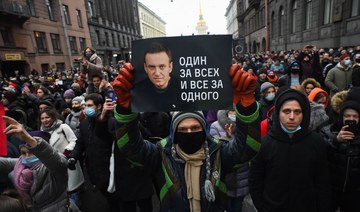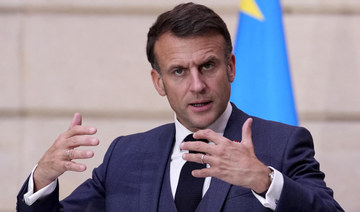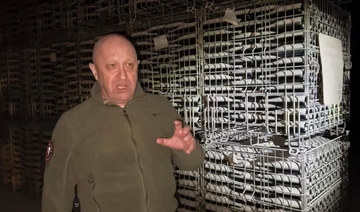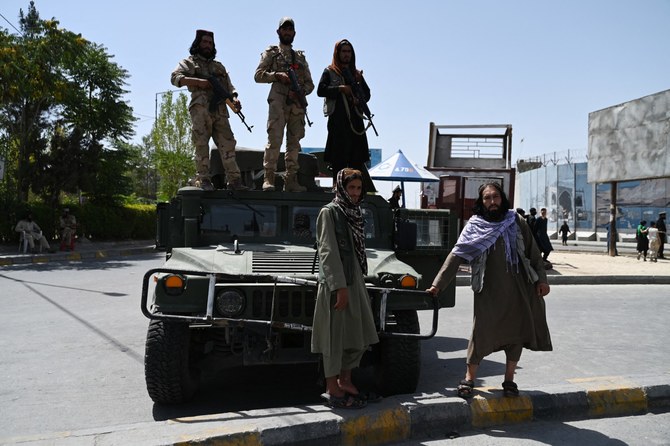MOSCOW: Chanting slogans against President Vladimir Putin, tens of thousands took to the streets Sunday across Russia to demand the release of jailed opposition leader Alexei Navalny, keeping up nationwide protests that have rattled the Kremlin. More than 5,000 people were detained by police, according to a monitoring group, and some were beaten.
The massive protests came despite efforts by Russian authorities to stem the tide of demonstrations after tens of thousands rallied across the country last weekend in the largest, most widespread show of discontent that Russia had seen in years. Despite threats of jail terms, warnings to social media groups and tight police cordons, the protests again engulfed cities across Russia's 11 time zones on Sunday.
Navalny's team quickly called another protest in Moscow for Tuesday, when he is set to face a court hearing that could send him to prison for years.
The 44-year-old Navalny, an anti-corruption investigator who is Putin's best-known critic, was arrested on Jan. 17 upon returning from Germany, where he spent five months recovering from nerve-agent poisoning that he blames on the Kremlin. Russian authorities have rejected the accusations. He was arrested for allegedly violating his parole conditions by not reporting for meetings with law enforcement when he was recuperating in Germany.
The United States urged Russia to release Navalny and criticized the crackdown on protests.
“The US condemns the persistent use of harsh tactics against peaceful protesters and journalists by Russian authorities for a second week straight,” US Secretary of State Antony Blinken said on Twitter.
The Russian Foreign Ministry rejected Blinken's call as “crude interference in Russia's internal affairs" and accused Washington of trying to destabilize the situation in the country by backing the protests.
On Sunday, police detained more than 5,000 people in cities nationwide, according to OVD-Info, a group that monitors political arrests, surpassing some 4,000 detentions at the demonstrations across Russia on Jan. 23.
In Moscow, authorities introduced unprecedented security measures in the city center, closing subway stations near the Kremlin, cutting bus traffic and ordering restaurants and stores to stay closed.
Navalny’s team initially called for Sunday’s protest to be held on Moscow’s Lubyanka Square, home to the main headquarters of the Federal Security Service, which Navalny contends was responsible for his poisoning. Facing police cordons around the square, the protest shifted to other central squares and streets.
Police were randomly picking up people and putting them into police buses, but thousands of protesters marched across the city center for hours, chanting “Putin, resign!” and “Putin, thief!" — a reference to an opulent Black Sea estate reportedly built for the Russian leader that was featured in a widely popular video released by Navalny’s team.
“I’m not afraid, because we are the majority," said protester Leonid Martynov. “We mustn't be scared by clubs because the truth is on our side."
At one point, crowds of demonstrators walked toward the Matrosskaya Tishina prison where Navalny is being held. They were met by phalanxes of riot police who pushed the march back and chased protesters through courtyards.
Demonstrators continued to march around the Russian capital, zigzagging around police cordons. Officers broke them into smaller groups and detained scores, beating some with clubs and occasionally using tasers.
Over 1,600 people were detained in Moscow, including Navalny's wife, Yulia, who was released after several hours pending a court hearing Monday on charges of taking part in an unsanctioned protest. “If we keep silent, they will come after any of us tomorrow,” she said on Instagram before turning out to protest.
Amnesty International said that authorities in Moscow have arrested so many people that the city's detention facilities have run out of space. “The Kremlin is waging a war on the human rights of people in Russia, stifling protesters’ calls for freedom and change,” Natalia Zviagina, the group’s Moscow office head, said in a statement.
Several thousand people marched across Russia's second-largest city of St. Petersburg, chanting “Down with the czar!” and occasional scuffles erupted as some demonstrators pushed back police who tried to make detentions. Over 1,100 were arrested.
Some of the biggest rallies were held in Novosibirsk and Krasnoyarsk in eastern Siberia and Yekaterinburg in the Urals.
“I do not want my grandchildren to live in such a country," said 55-year-old Vyacheslav Vorobyov, who turned out for a rally in Yekaterinburg. "I want them to live in a free country.”
Swedish Foreign Minister Ann Linde, who currently chairs the Organization for Security and Cooperation in Europe, condemned “the excessive use of force by authorities and mass detention of peaceful protesters and journalists” and urged Russia “to release all those unjustly detained, including Navalny.”
As part of a multipronged effort by authorities to block the protests, courts have jailed Navalny's associates and activists across the country over the past week. His brother Oleg, top aide Lyubov Sobol and three other people were put under a two-month house arrest Friday on charges of allegedly violating coronavirus restrictions during last weekend’s protests.
Prosecutors also demanded that social media platforms block calls to join the protests.
The Interior Ministry issued stern warnings to the public, saying protesters could be charged with taking part in mass riots, which carries a prison sentence of up to eight years.
Protests were fueled by a two-hour YouTube video released by Navalny's team after his arrest about the Black Sea residence purportedly built for Putin. The video has been viewed over 100 million times, inspiring a stream of sarcastic jokes on the internet amid an economic downturn.
Russia has seen extensive corruption during Putin’s time in office while poverty has remained widespread.
“All of us feel pinched financially, so people who take to the streets today feel angry,” said Vladimir Perminov who protested in Moscow. “The government's rotation is necessary.”
Demonstrators in Moscow chanted “Aqua discotheque!” — a reference to one of the fancy amenities at the residence that also features a casino and a hookah lounge equipped for watching pole dances.
Putin says neither he nor any of his close relatives own the property. On Saturday, construction magnate Arkady Rotenberg, a longtime Putin confidant and his occasional judo sparring partner, claimed that he himself owned the property.
Navalny fell into a coma on Aug. 20 while on a flight from Siberia to Moscow and the pilot diverted the plane so he could be treated in the city of Omsk. He was transferred to a Berlin hospital two days later. Labs in Germany, France and Sweden, and tests by the Organization for the Prohibition of Chemical Weapons, established that he was exposed to the Novichok nerve agent.
Russian authorities have refused to open a full-fledged criminal inquiry, claiming lack of evidence that he was poisoned.
Navalny was arrested immediately upon his return to Russia earlier this month and jailed for 30 days on the request of Russia’s prison service, which alleged he had violated the probation of his suspended sentence from a 2014 money-laundering conviction that he has rejected as political revenge.
On Thursday, a Moscow court rejected Navalny's appeal to be released, and the hearing Tuesday could turn his 3 1/2-year suspended sentence into one he must serve in prison.
Over 5,000 arrested at pro-Navalny protests across Russia
https://arab.news/mg9jn
Over 5,000 arrested at pro-Navalny protests across Russia
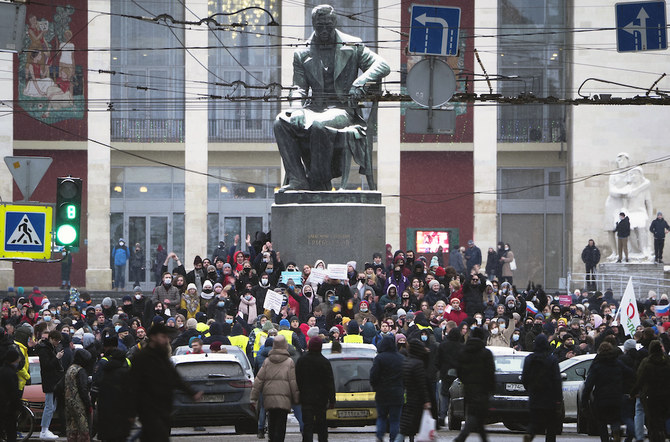
- Navalny’s supporters in Moscow plan to rally near the Kremlin administration and the headquarters of the FSB
- Police have said the protests have not been authorized and will be broken up, as they were last weekend
UK says to expel Russian defense attache as ‘undeclared military intelligence officer’
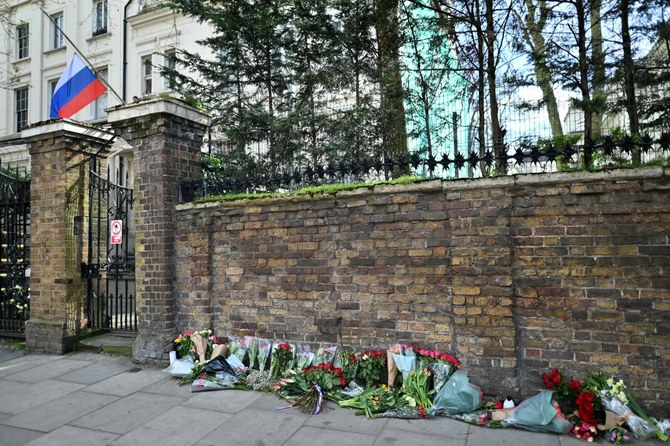
- Interior minister James Cleverly told parliament the UK would also remove the diplomatic status of several Russian-owned properties
- UK is currently a staunch NATO backer of Ukraine
London: The UK government on Wednesday raised tensions with the Kremlin by announcing it would expel a Russian defense attache for being “an undeclared military intelligence officer.”
Interior minister James Cleverly told parliament the UK would also remove the diplomatic status of several Russian-owned properties, including one in Sussex, southern England, and another in London “which we believe have been used for intelligence purposes.”
There would also be new restrictions on Russian diplomatic visas such as a cap on the length of time Russian diplomats can spend in the UK, he added.
The move comes with the UK concerned at an apparent increase in “malign” Russian activity on UK soil, including an arson attack on a Ukrainian-linked business allegedly orchestrated by the Kremlin.
A British man who it is claimed has links to the Wagner Group was charged in connection with that case last month.
London has previously accused Moscow of being behind the poisoning of two Russian former agents on UK soil, and of a spate of cyberattacks and disinformation campaigns.
The UK is currently a staunch NATO backer of Ukraine, providing training for troops and military equipment in the fightback against Russia.
Cleverly said the new package of measures was intended “to make clear to Russia that we will not tolerate such apparent escalations.”
He warned that Moscow would make accusations of Russophobia and spread conspiracy theories in response to his announcement.
“This is not new and the British people and the British Government will not fall for it, and will not be taken for fools by (President Vladimir) Putin’s bots, trolls and lackeys.
“Russia’s explanation was totally inadequate. Our response will be resolute and firm.
“Our message to Russia is clear: stop this illegal war, withdraw your troops from Ukraine, cease this malign activity.”
Four arrested for duping young Indian men into fighting for Russia in Ukraine
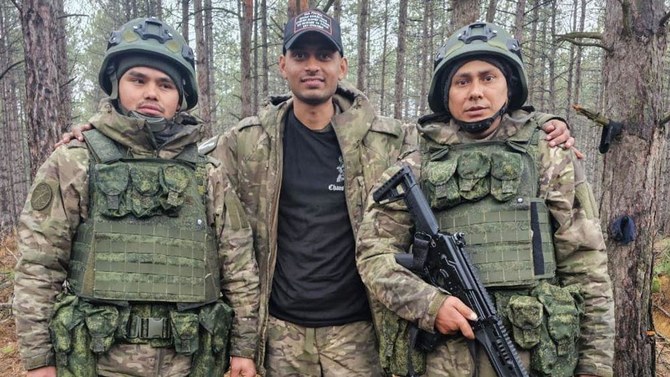
- Families of two Indian men who were killed in the war said that they had gone to Russia expecting to work as ‘helpers’ in the army
- At least 200 Nepalis are estimated to be serving in the Russian army and about 100 are missing
NEW DELHI: Indian police said four people linked to a network of human traffickers have been arrested on suspicion of luring young men to Russia with the promise of lucrative jobs or university places only to force them to fight in the war in Ukraine.
About 35 Indian men were duped in this manner, the Central Bureau of Investigation (CBI) said in March.
The four Indian nationals arrested were a translator, a person facilitating visa processing and the booking of airline tickets as well as two “main recruiters” for the southern states of Kerala and Tamil Nadu, the CBI said late on Tuesday.
The investigation “is continuing against other accused persons who are part of this international network of human traffickers,” the CBI said.
The families of two Indian men who were killed in the war have told Reuters they had gone to Russia expecting to work as “helpers” in the army.
India’s foreign ministry says each case has been “strongly taken up” with Russia. Moscow has not responded to repeated requests from Reuters for comment.
Other South Asian countries have also warned their citizens against such trafficking networks after multiple cases emerged of people being similarly duped into fighting in the Russian army.
Sri Lanka said on Wednesday that “a number” of its retired war veterans were lured to the Russia-Ukraine war front with the promise of a “handsome salary,” citizenship, and other benefits for serving in the army, none of which were granted.
“A significant number of war veterans have died and sustained injuries on the battlefield,” Sri Lanka’s Defense Ministry said, adding that the law would be “strictly enforced” in the matter.
A retired major and an employment agent have been arrested in this connection.
Nepal, which paused issuing work permits for Russia and Ukraine in January, has said several young unemployed Nepalis had been illegally recruited into the Russian army by agents who charged them hefty sums for visas.
At least 200 Nepalis are estimated to be serving in the Russian army and about 100 are missing, officials have said.
India has refused to condemn Russia over the war, calling instead for dialogue and diplomacy to end the conflict. The two countries have enjoyed a close relationship for decades, trading in items from fighter jets to tea.
India has also increased its purchase of cheap Russian oil since the war, with Moscow emerging as its top oil supplier in the last financial year for the second year in a row.
Police clearing Pro-Palestinian tent encampment at George Washington University, dozens arrested
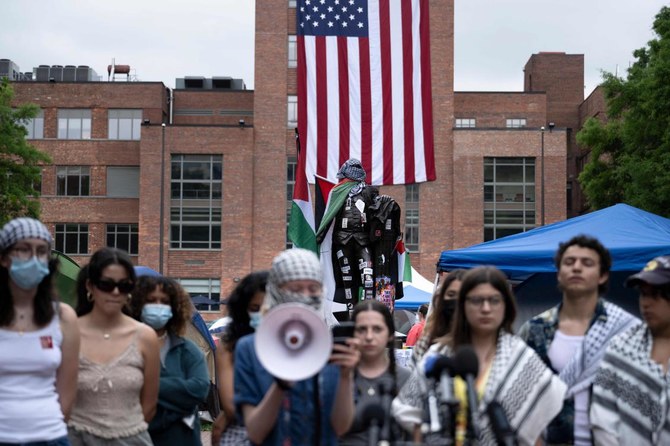
- A pro-Palestinian tent encampment was cleared at the University of Chicago on Tuesdday
- Tensions have continued to ratchet up in standoffs with protesters on campuses across the US
WASHINGTON: Police began to clear a Pro-Palestinian tent encampment at George Washington University early Wednesday and arrested dozens of protesters, hours after dozens left the site and marched to President Ellen Granberg’s home.
Officials at the university in Washington, D.C., had warned of possible suspensions for students engaging in protest activities on University Yard.
“While the university is committed to protecting students’ rights to free expression, the encampment had evolved into an unlawful activity, with participants in direct violation of multiple university policies and city regulations,” the university said in a statement.
Local media had reported that some protesters were pepper sprayed as police stopped them from entering the encampment and nearly 30 people had been arrested, according to community organizers.
In a statement, the District of Columbia’s Metropolitan Police Department said arrests were made for assault on a police officer and unlawful entry, but a number of arrests wasn’t immediately given. The department said it moved to disperse demonstrators because “there has been a gradual escalation in the volatility of the protest.”
Tuesday evening, protesters carrying signs that read, “Free Palestine” and “Hands off Rafah,” marched to Granberg’s home. Police were called to maintain the crowd. No arrests were made.
This comes as Mayor Muriel Bowser and MPD Chief Pamela Smith are set to testify about the District of Columbia’s handling of the protest at a House Committee on Oversight and Accountability hearing on Wednesday afternoon.
A pro-Palestinian tent encampment was cleared at the University of Chicago on Tuesday after administrators who had initially adopted a permissive approach said the protest had crossed a line and caused growing concerns about safety.
University President Paul Alivizatos acknowledged the school’s role as a protector of freedom of speech after officers in riot gear blocked access to the school’s Quad but also took an enough-is-enough stance.
“The university remains a place where dissenting voices have many avenues to express themselves, but we cannot enable an environment where the expression of some dominates and disrupts the healthy functioning of the community for the rest,” Alivizatos wrote in a message to the university community.
Tensions have continued to ratchet up in standoffs with protesters on campuses across the US — and increasingly, in Europe — nearly three weeks into a movement launched by a protest at Columbia University. Some colleges cracked down immediately on protests against the Israel-Hamas war. Among those that have tolerated the tent encampments, some have begun to lose patience and call in police over concerns about disruptions to campus life, safety and the involvement of nonstudents.
Since April 18, just over 2,600 people have been arrested on 50 campuses, figures based on AP reporting and statements from universities and law enforcement agencies.
But not all schools are taking that approach, with some letting protesters hold rallies and organize their encampments as they see fit.
The president of Wesleyan University, a liberal arts school in Connecticut, has commended the on-campus demonstration — which includes a pro-Palestinian tent encampment — as an act of political expression. The camp there has grown from about 20 tents a week ago to more than 100.
“The protesters’ cause is important — bringing attention to the killing of innocent people,” university President Michael Roth wrote to the campus community Thursday. “And we continue to make space for them to do so, as long as that space is not disruptive to campus operations.”
The Rhode Island School of Design, where students started occupying a building Monday, affirms students’ rights to freedom of speech and peaceful assembly and supports all members of the community, a spokesperson said. The school said President Crystal Williams spent more than five hours with the protesters that evening discussing their demands.
On Tuesday the school announced it was relocating classes that were scheduled to take place in the building. It was covered with posters reading “Free Palestine” and “Let Gaza Live,” and dove was drawn in colored chalk on the sidewalk.
Campuses have tried tactics from appeasement to threats of disciplinary action to resolve the protests and clear the way for commencements.
At the University of Chicago, hundreds of protesters gathered for at least eight days until administrators warned them Friday to leave or face removal. On Tuesday, law enforcement dismantled the encampment.
Officers later picked up a barricade erected to keep protesters out of the Quad and moved it toward the demonstrators, some of whom chanted, “Up, up with liberation. Down, down with occupation!” Police and protesters pushed back and forth along the barricade as the officers moved to reestablish control.
Dozens detained at Paris pro-Palestinian university protest
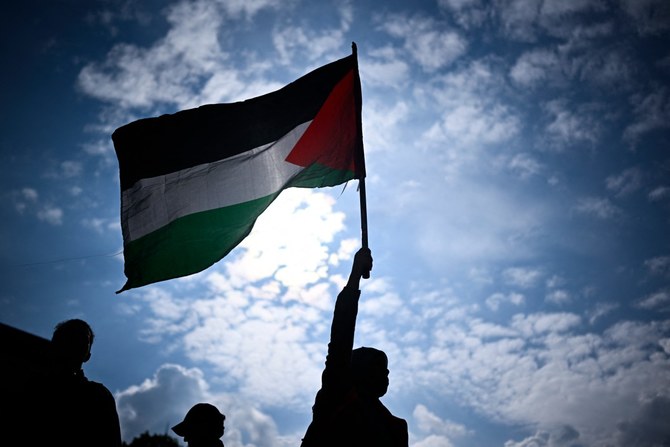
- Prime Minister Gabriel Attal said there would never be a right to disrupt France’s universities with such protests
- Police acted after about 100 students had been occupying a lecture theater for two hours
Paris: French police detained 86 people following an operation to remove students staging a pro-Palestinian occupation at the Sorbonne university in Paris, prosecutors said Wednesday.
Those arrested in the police operation on Tuesday night were being held for a variety of public order offenses, said the statement.
They include wilful damage, rebellion, violence against a person holding public authority, intrusion into an education establishment and holding a meeting designed to disrupt order. Some are also being held for participation in a group with a view to preparing violence or damage to property.
They can be held for an initial 24 hours, which can then be extended another 24 hours.
The day before police moved in, Prime Minister Gabriel Attal said there would never be a right to disrupt France’s universities with such protests.
Police acted after about 100 students had been occupying a lecture theater for two hours in “solidarity” with the people of Gaza, an AFP journalist on site noted.
Tuesday night’s police operation at the Sorbonne — and at another university on Paris’s Left Bank, Science Po university — followed interventions to end similar protests at the end of April.
Students at universities in several European countries have followed the actions on US campuses where demonstrators have occupied halls and facilities to demand an end to partnerships with Israeli institutions because of Israel’s punishing assault on Gaza.
Police have also intervened to clear campuses in the United States, Netherlands and Switzerland.
Palestinian militant group Hamas on October 7 attacked southern Israel, resulting in the deaths of about 1,170 people, mostly civilians, according to an AFP tally of Israeli official figures.
Israel estimates that 129 hostages seized on October 7, out of the 253 taken, are still being held in Gaza, including 34 the military says are dead.
Israel’s retaliatory offensive has killed at least 34,789 people in Gaza, mostly women and children, according to the health ministry in the Hamas-run besieged Palestinian territory.




